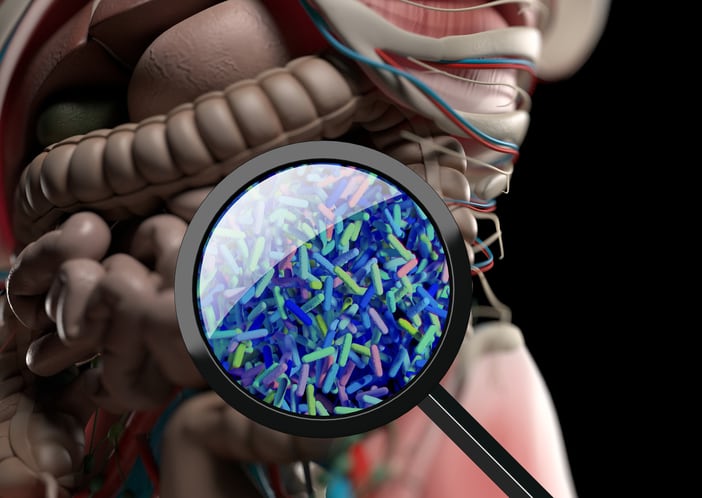Ömer Özkan CEO of Enbiosis, spent his early career in the renewable energy industry where he showed his entrepreneurial flair by building the first solar energy company in Turkey in 2013.
After three successful years, he decided to leave the firm to create a new venture in the UK, called Emsolt, a renewable energy investment firm. Less than two years later he sold the company and with 2 million dollars in his pocket he decided to build new businesses in completely new industries.
“The business in energy was not inspiring me any more and I wanted to use my earnings to do something big,” he told NutraIngredients.
He developed three startups including a legal AI tech firm named Adalet Hanim and an AI-tech based microbiome health firm named Enbiosis.
Özkan admits that just three years ago he knew ‘nothing’ about the microbiome but that his interest in the science was sparked by his business focused mind.
“I was trying to find out what was the best possible data based health startup and was researching about creating a business model based on human DNA when I found two scientists Özkan Ufuk Nalbantoğlu and Aycan Gündoğdu.”
Nalbantoglu, now CTO at Enbiosis, has discovered novel microbial biomarkers that can serve as diagnostic targets, biotherapeutical agents or biological mechanism references. He holds three patents on analysis and diagnostics of microbiome data.
Gündoğdu, now Enbiosis’ Chief Science Officer, holds two patents on the diagnosis of cirrhosis and Alzheimer's Disease from stool samples.
“They told me what the microbiome is and the future vision of the microbiome and I said ‘OK I want to be in this universe’.”
He gave his legal tech startup to his wife as wedding present, instead of a ring, and concentrated his efforts on Enbiosis.
He began working with the scientists to create a new algorithm which could be used to turn microbiome data into personalised diet advice. They tested their algorithm using open series data and Özkan says they discovered 48 different bacteria strains related to weight gain – 33 more strains than already discovered in the available literature at that time.
“In the following three months, three of the strains our algorithm found were then found in clinical studies. It was then that I realised what we are doing is far beyond the current approach to microbiome science.”
Realising this huge potential, the trio launched Enbiosis in August 2019, starting with an algorithm that could use microbiome analysis to find correlations between bacteria and health parameters, allowing them to offer personalised nutrition advice as well as supplements.
Originally the team’s plan was to launch the company in the UK, US, and elsewhere in Europe where awareness of microbiome health is much stronger than in Turkey. Unfortunately, COVID put a stop to those plans and they had to work locally.
But Özkan says this led them to creating an impressive bank of data to back up their service.
“When you are in a tough market it makes you stronger. We realised we need to be able to show some hard numbers that consumers can understand, to prove that it works, so we decided to start clinical trials.”
They conducted a pilot clinical study at the end of 2020 which compared the efficacy of their AI-based personalised diet to a low FODMAP diet for patients with IBS.
For the study, currently awaiting publication in ‘Gastroenterology Journal’, they enrolled 25 IBS patients. Faecal samples were obtained from all patients pre- and post-intervention and high-throughput 16S rRNA sequencing was performed. Patients were divided into two groups. The intervention group received six weeks of AI-based microbiome diet (n=14) and the control group received a low FODMAP diet (n=11).
Baseline and post-intervention IBS-SSS (symptom severity scale) scores and faecal microbiome analyses were compared.
The resulting data indicated that the IBS-SSS evaluation changed from severe to moderate in 82% (14 out of 17) of the intervention group, no such change was observed in the control group.
After gaining those results they started to promote the product to people with gut discomfort issues as well as to those looking to improve their general health.
Now running from a HQ in the UK and selling to customers around the country, Enbiosis offers a subscription model which provides two tests per year, access to their personalised diet recommendations and meal plan, plus personalised prebiotics.
They plan to open a new branch in Denmark which will mostly be used for R&D as they plan several more clinical trials as they expand throughout Europe. And their plan for expansion into the US involves a B2B business model, selling their tech to other health and nutrition companies.
Özkan says that while the company started in nutra, it also has legs in the pharma-sphere.
“Our long term strategy is to find new biomarkers and turn those into new products, such as next generation prebiotics for specific diseases.”


